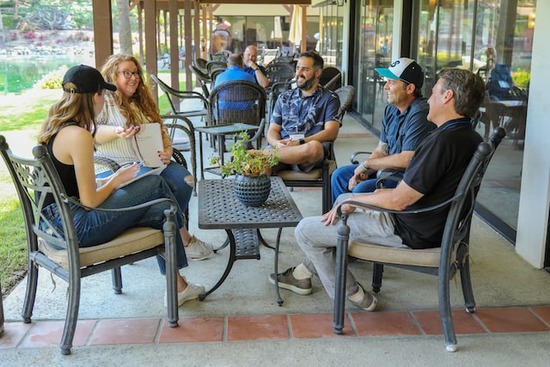Individual or Group Bible Study—Which Is Better?
They’re both great, of course! But depending on where you’re at and what your goals are, it’s worth looking into the different benefits of each.
Individual Bible study allows you—the individual—to dig into a Bible passage on your own time, in a place you choose, without distractions or an agenda. It’s valuable for reflection and meditation, and stopping to pray at any point.
But it requires some self-discipline and time management, and if you run into a passage of Scripture you have questions about, sometimes it can stall your momentum a bit.
Group Bible study, on the other hand, merges study with a sense of community and allows for discussion. Group members keep each other accountable and can share insights or even testimonies.
However, you’re also tied to a specific topic and sometimes you might want to move a little faster…or a little slower.
So could it be that combining these two approaches is the best way to experience the pros and avoid the cons of both?
See what you think as we look at the following:
- What makes an enriching individual Bible study?
- What are the typical components of a group Bible study?
- Similarities and differences between the two approaches
- How to have an effective group Bible study
We’ll make sure each type is properly defined before we get into the comparisons.
What makes an enriching individual Bible study?

Photo by Kelly Sikkema on Unsplash
Individual Bible study gives you time to privately dig into a topic or passage in the Bible, or you can read it through at your own pace.
In this kind of study, you may choose to follow a study guide that contains questions and directs you to certain passages. Or you might pick a passage and go through it verse by verse, writing down questions you have and comparing it with other passages.
For more depth, you may have a Bible dictionary or historical references that help you understand the text in its original context.
Some people also like to use a concordance to look up other passages that have the same keywords or phrases.
Learn more about the different study methods by reading our page about starting an individual Bible study.
What are the typical components of a group Bible study?
A group Bible study usually involves about three to twelve people getting together regularly to study. Oftentimes, the group will agree on a topic to study or use a pre-made study guide to follow. One person will take the lead each time you meet, and that duty may rotate depending on the group.
This group leader, who is more of a facilitator rather than a teacher, will make some preparations ahead of time to be able to direct the discussion to hit all the key points. They will often begin with an introduction to engage the group members. Then, they lead them through the study guide or Bible passage and ask thought-provoking questions.
Some Bible study groups may have some homework. The members might decide to go through a certain passage that will be discussed during the study. That can be helpful in formulating questions beforehand, or taking note of some interesting things you’d like to point out.
Regardless of the exact details, the purpose of a group study is to create an open and safe space for people to learn more about the Word of God together. The format and dynamics will of course differ from group to group, but many will follow similar models. It might almost feel like a book club meeting in some ways. (Because in most ways, it is!)
Biblical examples
Though people in the Bible didn’t have the Scriptures all collected in a book the way we do today, they still gathered together to learn more about God.
Jesus Himself had a small group that He trained and taught—His twelve disciples (Mark 3:13-19).
And when the early Christian church started, believers met in homes for fellowship, prayer, and learning about the doctrines of the Scriptures (Acts 2:42-47).
The apostle Paul encouraged this practice—an encouragement we can take to heart today:
“Let us consider how to stir up one another to love and good works, not neglecting to meet together, as is the habit of some, but encouraging one another, and all the more as you see the Day drawing near” (Hebrews 10:24-25, ESV).
Bible study groups are one way that we can meet together to encourage each other and “stir up…love and good works.” They allow us to support one another, hold one another accountable, and grow together.
Different kinds of group Bible studies

Photo by Small Group Network on Unsplash
Group Bible studies come in all kinds of varieties and formats.
Many of them are categorized by age group or stage of life. There are Bible studies for men, women, new parents, and young adults—to name a few.
For Adventists, group studies happen in different settings too, such as:
- Within a small group in someone’s home
- During Sabbath School (the Adventist version of Sunday School) at church every week
- During a midweek gathering (often known as “prayer meeting”) at church
Sometimes, the group Bible study might have a special purpose, such as preparing the members for baptism. These studies, called baptismal studies, are often led by a pastor or a trained Bible instructor.
To learn more about getting involved with baptismal studies, reach out to your local church’s pastor.
Now that we know a bit more about group Bible studies, let’s see how they compare to individual ones.
What are the similarities and differences between a group Bible study and an individual Bible study?
Both group and individual Bible studies usually involve an in-depth dive into the Word of God, and a study guide may be used in either case. But the biggest difference is the change in dynamics from studying alone to studying in a group.
Being in a small group provides a sense of community. It allows people to connect with like-minded individuals and learn together about God’s Word. They’re able to encourage each other.
A group study will also have more structure—which can be a pro or a con. Often, the study will be based on pre-prepared material, so you may not get to choose the topic. As a result, you may not get to study something you’d like to study, and perhaps the discussion heads in a different direction than you were hoping.
In the process, however, you might learn something new and interesting!
And though individual study can lead to some incredible discoveries, people in a group setting get to share insights from their diverse backgrounds and experiences. You may reach conclusions you wouldn’t have thought of on your own.
Proverbs 27:17 puts it this way: “Iron sharpens iron, and one person sharpens another” (CSB).
Part of this sharpening occurs as the group offers the motivation and accountability for applying the insights from the Word of God.
When we’re on our own, we can spend a lot of time in prayer and make efforts to journal, or if we want to keep on reading, we can. But sometimes we need some external motivation to help us grow. Sometimes we’re hesitant to tackle some challenging concepts on our own, and it can be tempting to skip over some parts. But a group can stretch and challenge us beyond our comfort zones and broaden our perspectives.
So, how can we experience these benefits?
How to have an effective Bible study group

Photo by Humble Lamb on Unsplash
A Bible study group doesn’t have to be difficult to start. It simply takes some intentionality to create an engaging experience for everyone involved.
Here are some basic principles:
Pray
Prayer should be the foundation of every Bible study group. As you plan your first one, pray for the Holy Spirit to guide your decisions. And pray for the personal growth of each of the individuals who will be in the group.
Decide on a purpose
Consider what you want the group’s focus and target audience to be.
Will it be about getting acquainted with the different aspects of God’s character? Or learning relevant lessons from lesser-known Bible stories? Or finding biblical wisdom for parenting?
Once you’ve decided your purpose, it’s time to get practical.
Make a plan
Decide when and where the study will take place. Be sure to develop a consistent schedule—such as weekly, biweekly, or monthly—so the members will come to expect the study.
Also, pick a topic to study or a workbook to use. What you choose will depend on the purpose you decided for your group.
Prepare
If you plan to facilitate the study, take some time to pray and prepare ahead of time. You’ll want to be familiar with the contents of the weekly plan or lesson.
Highlight important points or questions you want to ask. Make a list of the passages you want the group to read. And think of experiences and insights you could share to help get the ball rolling.
If you feel uncomfortable with leading the study, you could also ask someone else to facilitate it. That’s totally okay too! You could even create a rotating facilitator list.
Create a nurturing environment
A key to an enjoyable Bible study atmosphere is providing an opportunity for everyone to share thoughts without feeling judged. When people know their ideas won’t be immediately shot down, they will be more willing to take part in a discussion and explore the concepts.
Encourage your group to be open and accepting of different perspectives while gently directing them to the Word of God for answers. We all come from different backgrounds and experiences, and it can be easy to take for granted the things we’ve already learned. It’s best to take on each concept, each question, each story, with an open heart and mind that can look at it in a new way each time.
Stay grounded in Scripture
At times, Bible study groups can veer away from their purpose, becoming discussions about opinions rather than what the Bible says. That’s why it’s so important for the facilitator to guide the discussion back toward Scripture passages so that all the members are nurtured in their relationship with Christ.
At the same time, it’s not wrong to be open to the Holy Spirit’s leading. Sometimes “rabbit trail” discussions can lead to unexpected insights of biblical truth, or new ways to apply the concepts you’ve been learning about.
And that’s the value of a small group study—experiencing those organic discussions and striving together to understand the truth in a practical way. It can also bond you as a group in ways other activities can’t.
The two types of Bible studies meet different needs
Individual or group Bible studies? Both have their place!
Someone who is new to the Word of God and wants to study its teachings may prefer to study alone to have time to think through concepts.
If you’re a busy mom with young children, it may be easier to study early in the mornings when the kids are asleep.
Or maybe you’re fresh out of college and would love the social aspect of a group that meets weekly.
Depending on your personality, interests, and needs, one may be more relevant to you at a certain season in your life than the other. Or, you may find both beneficial for different aspects of your spiritual growth.
Curious to learn more about Bible study groups in the Adventist Church? Reach out to your local church to find out if it offers any groups like this. If not, maybe you can help start one, using the steps above.
Also, learn more about Sabbath School, a weekly Bible study group that happens at nearly every Adventist Church each Saturday.
Related Articles
Questions about Adventists? Ask here!
Find answers to your questions about Seventh-day Adventists
More Answers
The Health Benefits of Fresh Air You Should Know About
The Health Benefits of Fresh Air You Should Know About“When you can’t breathe, nothing else matters,” the American Lung Association tells us. And while that’s true, the kind of air you’re breathing will determine the health benefits you experience. Breathing fresh...
What Do Seventh-day Adventists Choose to Eat?
What Do Seventh-day Adventists Choose to Eat?Food blogs overwhelm the internet; food fads are all the rage; and copycat and healthy versions of food are the subject of many a get-together. Eating—and eating the best way—is a big deal. And everybody has a different...
10 Incredible Ways Sunlight Can Improve Your Health
10 Incredible Ways Sunlight Can Improve Your HealthAre you concerned about sunlight’s negative effects? You might be the one who lathers on the sunscreen and covers up when you go outside. Or maybe you avoid being outside as much as possible. You might be surprised,...
Why Is Water So Important?
Why Is Water So Important?We all know that water is a substance we can’t live without. It quenches our thirst and keeps us hydrated on the inside. And it’s necessary for hygiene and cleansing on the outside too. But did you know that the cleansing properties of water...
Ellen White’s Writings and the Adventist Health Message
Seventh-day Adventists are known for their emphasis on healthy living. And Ellen G. White was a significant influence in the development of this priority and practice among Adventists.
Health Clinics
Ellen White and Adventist Healthcare—Ahead of Their Time Medical care in the mid-1800s was primitive, to say the least. Basic concepts we take for granted—such as proper handwashing or recognizing the dangers of bloodletting—were nonexistent. And doctors often had...
What Did Ellen White Teach about Vegetarianism?
What Did Ellen White Teach about Vegetarianism?One thing you might have heard about Seventh-day Adventists is their emphasis on a vegetarian lifestyle. If you’re wondering why that is, it goes back to our church’s humble beginnings: As Adventists studied the Bible,...
How Ellen White’s Teachings Can Improve Your Health
How Ellen White’s Teachings Can Improve Your Health Healthcare in the nineteenth century was said to leave “more disease than it took away” with its use of bloodletting and “medicines” like mercury and arsenic.1 As people questioned these methods, new approaches...
Change Your Perspective on Life with These 5 Mindsets
5 Biblical Mindsets to Change Your Life for the Better Sometimes, life is just plain hard. There’s no way around it. So would thinking about things differently really change anything? Our perspective on life, and everything it throws at us, affects more than we’re...
Bible Promises for When You’re Worried or Fearful
Bible Promises for When You’re Worried or Fearful The Bible is full of beautiful promises that can comfort us in a variety of situations. They can give us hope when we are hopeless, make us feel grateful for God’s love, and comfort us when we’re grieving or suffering....
12 Practical Ways to Overcome Worry
12 Practical Ways to Overcome Worry DISCLAIMER: This content is for informational purposes only. It does not constitute any professional medical advice and is not intended as a substitute for professional mental health therapy. It’s easy to get stuck in a cycle of...
How the Bible Talks About Worry, Fear, and Anxiety
How the Bible Talks About Worry, Fear, and Anxiety Worry and fear are the ingredients of anxiety. It’s easy to see how the world isn’t perfect—and the anticipation of a bad event or experience (that may or may not even happen) can end up draining the peace and...
How to Calm Anxious Thoughts, Using the Bible
How to Calm Anxious Thoughts, Using the Bible You were expecting a phone call from your daughter half an hour ago, and she still hasn’t called. She’s also not answering your calls. You feel your heart thumping as your thoughts race: What if she’s been in a car...
What You Should Know About the Adventist Health Studies
What You Should Know About the Adventist Health StudiesYou may have heard that Seventh-day Adventists care about health. But what you may not know is that Adventists have been the subjects of long-term research into lifestyle and health. Since 1958, researchers from...
Benefits of Sunlight
Yes, There Are Health Benefits of SunlightDespite the bad reputation it’s gotten, sunlight is generally associated with positivity, as shown by songs like “You Are My Sunshine,” or phrases that refer to delightful people as having a “sunny disposition.” There’s a...
Why Your Body Needs Rest for Optimal Health
Why Your Body Needs Rest for Optimal HealthStruggling to think straight? Wondering why you can’t remember that important tidbit you heard earlier today? Feeling like your emotions are about to explode? These are just some of the symptoms that can reveal your need for...
The Seventh-day Adventist Diet: One of Our Key Longevity Secrets
The Seventh-day Adventist Diet: One of Our Key Longevity SecretsOats, avocados, lentils, tofu—probably not what you first think of in a standard American diet. But if you show up at the home of an Adventist, chances are you may be served one of these staples. Out of a...
Why You Need Fresh Air
Why You Need Fresh Air“When you can’t breathe, nothing else matters,” the American Lung Association tells us. We couldn’t agree more! Breathing in clean air is an essential part of caring for our bodies, which God has given us. Together with other health principles,...
Sabbath Meal
Everything You Need to Know About Sabbath MealsFor Seventh-day Adventists, sharing a Sabbath meal with friends and family is one of the most special and memorable parts of the Sabbath. That’s why we want to share with you all about Sabbath meals and why they’re such a...
Adventists and Healthy Living
Adventists and Healthy LivingWhat’s the Adventist “Health Message” All About? One thing Seventh-day Adventists are known for is their emphasis on living healthy lives. Since our bodies are living temples of the Holy Spirit (1 Corinthians 6:19, 20), we strive to stay...
Water’s Importance—Physical Benefits and Spiritual Applications
Water’s Importance—Physical Benefits and Spiritual Applications We all know that water is a substance we can’t live without. Not only does it quench our thirst and keep us hydrated from the inside, but it’s necessary for hygiene and cleansing on the outside as well....
How Important is a “Day of Rest?”
How Important is a “Day of Rest?” Why God Created a Day for Downtime by Martin Casper Do you ever experience the feeling of complete overload? Do you feel like the only way you can get ahead is by slamming it 24/7? I hear these types of comments more and more...
7 Reasons Why a Day of Rest is Important
7 Reasons Why a Day of Rest is ImportantWe live in a fast-paced world. It seems as if success is measured in how much you can do in a short amount of time. (Extra points for the service or product that is available 24/7). The idea that we will be more successful if we...
How do Adventists choose what to eat?
How do Adventists choose what to eat?Every day, parents go through the ritual of getting their kids to eat what is healthy and good while trying to steer them away from what can hinder the growth of their developing bodies. Nutritionists work with their clients to...
How Can I Have a Better Marriage?
Is it possible to have a happy marriage?
How do Adventists make movie and music choices?
How do Adventists make movie and music choices?Cinema has come a long way since the first clips of motion pictures came to light in 1878. As the decades rolled on, film and music producers have created rivers of movies and albums for the masses. Today, watching movies...
Why are many Adventists Vegetarian?
Why are many Adventists Vegetarian?The diet intended for man is outlined in Genesis 1:29, “And God said, ‘See, I have given you every herb that yields seed which is on the face of all the earth, and every tree whose fruit yields seed; to you it shall be for food.’”...
Didn’t find your answer? Ask us!
We understand your concern of having questions but not knowing who to ask—we’ve felt it ourselves. When you’re ready to learn more about Adventists, send us a question! We know a thing or two about Adventists.























